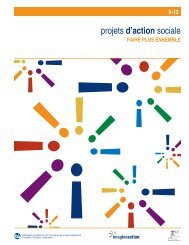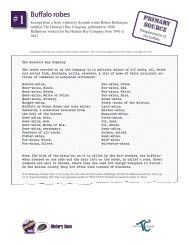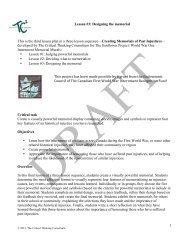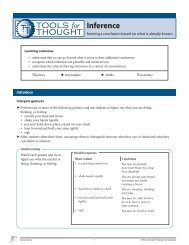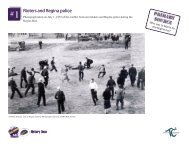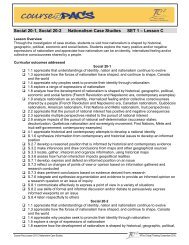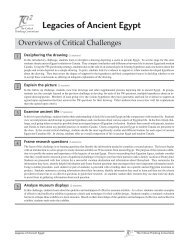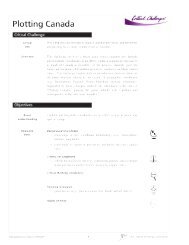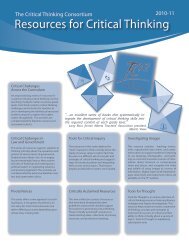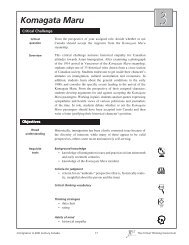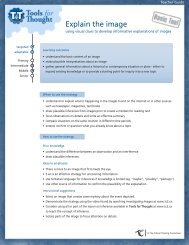Inquiry-mindedness - The Critical Thinking Consortium
Inquiry-mindedness - The Critical Thinking Consortium
Inquiry-mindedness - The Critical Thinking Consortium
Create successful ePaper yourself
Turn your PDF publications into a flip-book with our unique Google optimized e-Paper software.
TEACHER RESOURCE #6Understandingpoverty➤➤➤➤Invite students to share their definitions. Look for similarities and differences among the definitions.Post them in the room for future reference.Resources for this activity have been adapted from the website http://homepages.wmich.edu/~ljohnson/Payne.pdf entitled Understanding and Working with Students and Adults fromPoverty. This website provides background information about poverty and reflects the work ofDr. Ruby Payne, teacher, principal, consultant, administrator, and author of A Framework forUnderstanding Poverty.➤➤Provide students with copies of the Poverty: Key points (ActivitySheet #6C). Assign each pair of students one key point to respondto in the following manner:• What surprised you?• What made sense?• What didn’t you understand?• What did you wonder about?Poverty: key points ACTIVITY SHEET #6C ➤➤Divide students into groups according to the key point theywere assigned. Invite students to share their responses,clarify together the significance of the statement, andcreate an example that would illustrate the key point. Tools for Thought 2008-09:3 57 © <strong>The</strong> <strong>Critical</strong> <strong>Thinking</strong> <strong>Consortium</strong>➤➤➤➤➤➤Reorganize the class in groups of six, with one representative for each keypoint. Invite each person to explain their statement to the rest of the group.Explain to students that the key points discussed above came from the research of Dr. Ruby Payne.Dr. Payne has written many books to help people understand the impact of poverty. Her researchhas been focussed on large groups of people who lived in poverty, people who were “middle class,”and people who were wealthy. From her research, she identified common behaviours, beliefs, andattitudes she calls the “rules” of each group. <strong>The</strong>se are generalizations so the statements do notapply to all individuals but they do help us better understand the reality of poverty.Provide each pair of students with a set of cards created fromHidden rules of poverty (Activity Sheet #6D). For ELEMEN-TARY students, select the most appropriate rule cards for useas a whole class or a group activity. Instruct students to readeach rule card and determine whether each rule would applyto people living in generational poverty, middle class,or wealth. Remind students that these are generalizationsbased on large populations, so they will not apply to allindividuals.<strong>The</strong> “world” is thelocal neighbourhood orcommunity.Physical fighting is howconflict is often resolved.People who can physicallydefend themselves arerespected.How much food you have isimportant.Hidden rules of povertyGenerational poverty Middle class WealthyDecisions are based on Decisions are based on work Decisions are based onsurvival, relationships, and and achievement.social, financial, andentertainment.political connections.<strong>The</strong> “world” is national.Travel is within the country.Fighting is done verbally.Physical fighting is viewedwith distaste.<strong>The</strong> “world” isinternational.Conflicts are solved throughlawyers and including orexcluding people socially.ACTIVITY SHEET #6D➤➤Discuss student responses. Invite SECONDARYstudents to speculate on the impact of these rules ineach category.Choices are not part of life.Too much education isfeared because the personmight leave.<strong>The</strong> quality of the food youhave is important.Choice is a key concept inthe lifestyle. Sometimeschoices need to beconsidered.Formal education is seen askey to future success.How the food you havelooks (presentation) isimportant.Choice is always a part oflifestyle. Generally nothinginterferes with choices.Education is for the purposeAdapted from the work of Ruby Payne: http://homepages.wmich.edu/-ljohnson/payne.pdf➤➤Invite students to talk about or write a reflectionabout what they have learned about poverty.of social, political, andfinancial connections andto enhance artistic andaesthetic appreciation.Tools for Thought 2008-09:3 58 © <strong>The</strong> <strong>Critical</strong> <strong>Thinking</strong> <strong>Consortium</strong>Tools for Thought 2008–09:3 50 © <strong>The</strong> <strong>Critical</strong> <strong>Thinking</strong> <strong>Consortium</strong>



